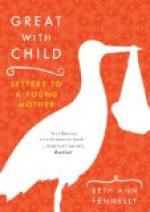This may be the most proper place for observing that great care ought to be taken, at the birth of the child, to prevent a too sudden exposure of the tender organ of vision to the light. We believe this caution is generally omitted by the American physician, though it is one which accords with the plainest dictates of common sense. Who of us has not experienced the pain of emerging suddenly from the darkness of a cellar to the ordinary light of day? The strongest eyes of the adult are scarcely able to bear the transition. How much more painful to the tender organs of the new-born infant must be the change to which it is so frequently subjected? And how easy it is to prevent the pain and danger of the change, by more effectually darkening the room into which it is introduced!
But we have testimony on this point. A distinguished German physician states that he has known many cases of permanent blindness from this very cause to which we have referred. The Principal of the Institution for the Blind, at Vienna, says he is confident that most children who appear to be born blind, are actually made blind by neglecting this same precaution.
CHAPTER II.
TEMPERATURE.
General principle—“Keep cool.” Our own sensations not always to be trusted. Thermometer. Why infants require more external heat than adults. Means of warmth. Air heated in other apartments. Clothes taking fire. Stove—railing around it. Excess of heat—its dangers.
There is one general principle, on this subject, which is alike applicable to all persons and circumstances. It is, to keep a little too cool, rather than in the slightest degree too warm. In other words, the lowest temperature which is compatible with comfort, is, in all cases, best adapted to health; and a slight degree of coldness, provided it amount not to a chill, and is not long continued, is more safe than the smallest unnecessary degree of warmth.
But the application of this rule to those over whom we have control, is not without its difficulties. Our own sensations are so variable, independently of external and obvious causes, that we cannot at all times judge for others, especially for infants. The absolute and real state of temperature in a room can only be ascertained by the aid of a thermometer; and no nursery should ever be without one. It should be placed, however, in such a situation as to indicate the real temperature of the atmosphere, and not where it will give a false result.
No mother should forget that the infant, at birth, has not the power of generating heat, internally, to the extent which it possesses afterward. The lungs have as yet but a feeble, inefficient action. The purification of the blood, through their agency, is not only incomplete, but the heat evolved is as yet inconsiderable. In the absence of internal heat, then, there is an increased demand externally. If 60 be deemed suitable for most other persons, the new-born infant may, for a few days, require 65 or even 70.




